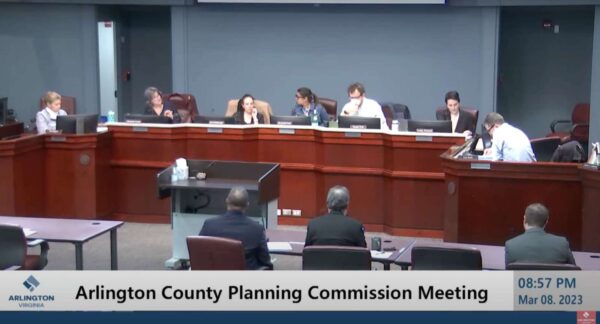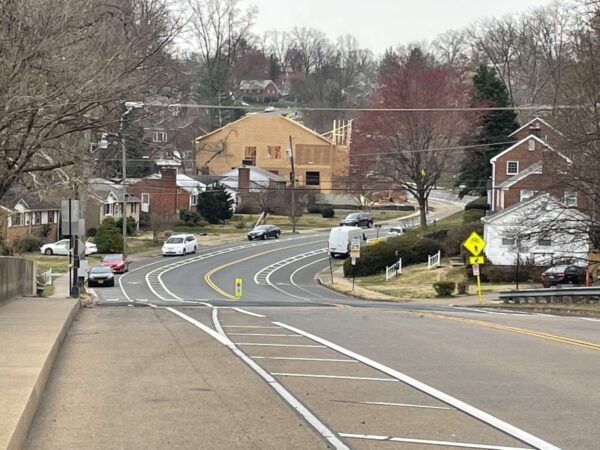
(Updated 11:45 a.m.) Arlington’s Planning Commission voted 8-0 to recommend the Arlington County Board adopt the most flexible option of the proposed zoning changes, known as “Missing Middle.”
Commissioners Denyse “Nia” Bagley and Leonardo Sarli abstained during last night’s vote. Next, the ordinance to allow the by-right development of 2-6-unit buildings on lots currently zoned for single-family homes is slated to go before the Arlington County Board on Saturday, March 18.
“This has been a multiyear process,” said Planning Commission Chair Devanshi Patel. “It hasn’t been just December to March. Staff has labored on this for many, many, many years, and many, many, many hundreds of hours have been put into this process — including lots of hours by this commission itself.”
The county says this will help counteract the last century’s exclusionary housing policies while increasing the supply of options for people looking to buy a smaller, more moderately priced home than what is commonly built today. Large single-family homes have been replacing smaller, older single-family homes throughout the county for years.
Opponents say it is unclear whether the changes will meet those goals. The group Arlingtonians for Upzoning Transparency, formed to oppose the proposal, blasted the Planning Commission for “recommending [the] most extreme Missing Middle options.”
Arlington County staff presented a number of options to commissioners, with their preferred recommendations. Mostly, the commission supported the recommendations of county staff.
In a deviation from staff, the commission recommended removing parking mandates for lots near transit. Staff had recommended 0.5 spaces per unit for these lots.
The Planning Commission also supported 5- and 6- unit buildings on the widest number of lots, which YIMBYs of Northern Virginia Director of Communications Adam Theo, and former County Board candidate, heralded as “the best option for providing homeowners flexibility” during public comment.
Annual caps on the number of permits for “Expanded Housing Option” projects proved an impasse for the commission. Staff had no recommendation here, and the only consensus the commission could reach was that any cap should have a three-year sunset clause.
Missing Middle proponents had advocated fiercely for no caps. A limit of 58 permits per year was proposed, but opponents did not seem to champion this as a concession.
“We have a responsibility to consider what the impacts will be and how it works with competing policies,” said Commissioner Elizabeth Gearin. We don’t know if this will have the outcome that we want, or if it’ll have negative impacts — if we’ll be displacing potentially low-income minority home owners in favor of moderate-income renters.”
“For this reason,” she continued, “I am definitely supporting caps, either that or some sort of pilot study, until we know more than we originally new and that we examine these impacts as we go forward.”
Member Daniel Weir said there is “no rationale in Arlington County’s Comprehensive Plan, or other planning documents, upon which to recommend annual limitations to EHO permits.”
Vice-Chair Sara Steinberger said she appreciates the sentiment behind this, but caps are “an appropriate way to push us into EHO and see what impact that has on the county.”
When the final vote came, Sarli confessed he “was struggling,” before ultimately abstaining.
“I think it’s really great our community is embracing this — a little trepidatiously — but it is,” he said.
Sarli did make two recommendations that received full approval from the commission. One was the creation of a design guidebook with conceptual designs for EHO conversions and new constructions.
The other was a future study of ways to tackle policy concerns like the proliferation of oversized dwellings, including single-family homes derided by critics as “McMansions.” Commissioners wondered whether it might remain more profitable for developers to simply continue building large single-family homes, undermining the advancement of EHOs.

Sarli had a message for the Arlington County Board, expressing dismay with the unfolding of the multi-year process, which was rife with contention.
“There [have been] some unforced errors we could have avoided along the way,” he said. “I really would ask the County Board to avoid a similar process in the future and not put the cart in front of the horse, where we had several years of hypothetical planning and a five-week process once we actually got to the substance of the issue.”
Opponents urged the Planning Commission to stop consideration of the plan until the impacts on infrastructure are considered.
In the past, said engineer and attorney David Gerk, who has lived in Arlington since 2002, “the refusal to plan in advance, before approving significant land-use changes,” has resulted in a precipitous decline in tree canopy, growths in heat-trapping and impervious surfaces and longer emergency response times.
Speaking on behalf of Arlingtonians for Upzoning Transparency, he said residents rely on a leaking water distribution and sanitary sewer system and an electric grid “on life support.” They send their kids to schools with a permanent supply of portable trailer classrooms and fight over oversubscribed public land, he contended.
“Do the work that needs to be done to determine the true community impacts,” Gerk said. “How can you carry out your duties as commissioners to advise the County Board on ‘orderly development of the county’ without any of this critical information?”
“There is no broad-based consensus in our community for this policy, and in fact, concerns and opposition continues to grow,” Gerk said in a subsequent statement. “Unless the County Board moderates this MMH Plan, we will be left with a dramatically divided community and a damaged political process.”

